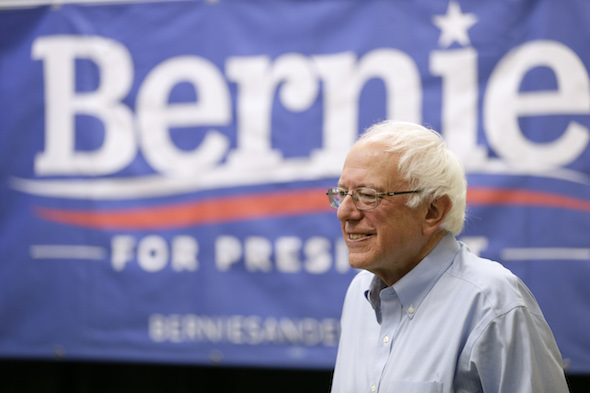
Immediately after the Democratic presidential debatelast night, Van Jones offered two astute observations: “class won,” as did Black Lives Matter. The former, of course, was the triumph of the Sanders campaign (although it was actually former Virginia Sen. Jim Webb who inaugurated the debate’s discursive revolution by beginning with “working people” rather than “middle class”) while the latter is a tribute to the thousands who have so doggedly stayed in the streets and rudely interrupted political business as usual.
Angry passion and insubordination joined together can succeed as can Old Testament wrath in the case of our guy from Vermont. For the first time since the election of Ronald Reagan, the continuous Republican rightward shift has not been mirrored by a Democratic accommodation to its premises.
Sanders — can we actually be so hopeful? — has drawn a line in the sand on economic inequality that people under thirty seem to overwhelmingly support and which may yet subtract many black and Latino voters from the Hillary column.
And no one since Upton Sinclair has framed “democratic socialism” — as the restoration of the working class’s “fair share” in the national income — in such a commonsensical and compelling way. Likewise, his crusade for free public higher education is a radical “transitional demand” with more resonance among youth and young adults than any other proposal yet presented.
But the limitations of Sanderism are also clear. Economic inequality is not mollified by publicly subsidized economic opportunity, a more level playing field for family-owned business, or higher taxes. For socialists the central question is always the private ownership of the large-scale means of production and the democratization of economic power.
Although Sanders would break up the biggest banks, he apparently would not publicly own them or operate them as public utilities. Likewise with pharmaceutical corporations. The failure to raise the property question was also the Achilles’ heel of the Occupy movement, of which Sanders has become the national candidate.
If one wants to map the genealogy of the “1 percent versus the 99 percent,” it descends not only from William Jennings Bryan and the People’s Party but especially from the Progressive Republicans who supported the New Deal’s brief offensive against corporate power, like the great George Norris of Nebraska.
Eugene Debs — see any of his speeches — talked about inequality always in the context of ownership and decision-making, of expropriating the power of plutocrats, not just taxing them. Sanders, like the Progressives, wants to break up the trusts and support small business, not democratize and take possession of them. (Unions, incidentally, did not get a soundbite the entire evening.)
On international affairs, Sanders was frankly a complete disappointment, as evinced in his boilerplate support for “intervening in Syria only as part of a coalition with the Arab states.” Which means? Saudi Arabia, the Gulf, the murderous military regime in Egypt . . . who else could he be talking about?
He had a brilliant opportunity to support the Kurds and denounce themassacre in Turkey, but apparently this is off limits in a campaign focused almost exclusively on economic justice in the homeland. Likewise, he deliberately avoided the chances to dissent from Clinton and Webb’s provocative remarks about confronting Russia and China.
Sander is a great economist populist, but not an anti-imperialist. However, in my view, this is only a more urgent reason to become involved in the Sanders campaign and criticize it from the inside, as supporters.



Expositores: Oscar Vidarte (PUCP) Fernando González Vigil (Universidad del Pacífico) Inscripciones aquí. Leer más
Una retrospectiva para entender los próximos cuatro años. Leer más
En la conferencia se hará una presentación de los temas más relevantes del proceso de negociación se llevó a cabo desde el 2012, así como del acuerdo de paz firmado entre el Gobierno colombiano y la guerrilla de las FARC a finales del 2016. Se analizarán los desafíos y las... Leer más
El Observatorio de las Relaciones Peruano-Norteamericanas (ORPN) de la Universidad del Pacífico es un programa encargado de analizar y difundir información relevante sobre la situación política, económica y social de Estados Unidos y analizar, desde una perspectiva multidisciplinaria, su efecto en las relaciones bilaterales con el Perú.
© 2026 Universidad del Pacífico - Departamento Académico de Humanidades. Todos los derechos reservados.

